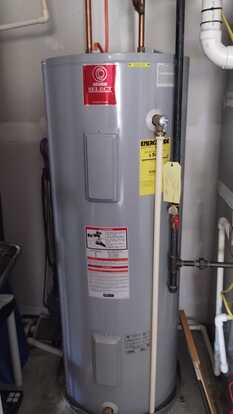|
Leaks and low hot water pressure are two obvious indicators that your hot water heater isn't functioning correctly. Certain problems are fixable. Additional issues point to the need for replacement. We'll talk about when to replace a water heater in this guide. It offers advice on how to better maintain your water heater. Water Heater LifespanYou might be able to fix the current water heater if it leaks or doesn't heat up in certain situations. However, it's useful to start by finding out how long the appliance will last for servicing. A water heater should last eight to twelve years on average, based on the manufacturer's recommended service life. This depends on a number of factors, including the unit's location and design, installation quality, maintenance plan, and water quality. It's probably time to replace your water heater if it's older than ten years, has leaks around the tank's base, or acts strangely. To assist reduce your energy costs, think about replacing your water heater with a more energy-efficient one. To assist with the overall cost, look for local utility rebates and federal tax credits in your area. Care and Maintenance HistoryAny water heater's life can only be preserved and extended with proper maintenance. If you neglect routine maintenance, you might need to replace or repair your equipment sooner. At minimum once a year, the tank on your water heater needs to be emptied, cleaned, and flushed in order to maintain optimal performance. If you reside in a region with hard water, you might want to consider having a six-monthly water heater servicing. Compared to water heaters with tanks, tankless water heaters require less maintenance. Nevertheless, yearly flushing of the hot water system is necessary to avoid sediment accumulation from mineral and lime deposits. A tankless water heater can be turned off and cleaned with water and white vinegar for sixty minutes to get rid of this accumulation. Signs of WearAn increased utility bill is frequently an indication of problems with any type of water heater. It's time to investigate more if your unit is consuming more energy to produce the same amount of hot water. What to search for: Leaks: Your water heater needs to be changed right once if there are leaks. The main cause of leaks is typically an accumulation of pressure inside the tank. This occurs when the unit's relief valve malfunctions or the water pressure or temperature is too high. The result of ignoring a leak is a tank explosion. Moisture or puddles around the base of the water heater and water corrosion on the side of your tank are indicators that there is a leak. If you see any of these warning indicators, get in touch with a reputable expert right now. Knocking Noises, such as knocking, are a sign of silt accumulation. Sediment can migrate throughout the tank and produce gurgling, rumbling, and pounding noises as it solidifies. Have your water heater cleansed on a regular basis to remove any deposits from the heating elements in the tank. This will prolong its lifespan and prevent needless wear and strain. Rusty Water: Discolored water is an obvious indicator that something is wrong with your unit. Water that has a metallic smell or a rusty tint might indicate several things. It is necessary to repair the sacrificial anode rod or the tank itself is starting to rust, which is frequently the result of corrosion at the steel lining. Tanks that have deteriorated need to be replaced right away. Cloudy Water: If your water appears murky, it can be a sign that sediment has accumulated in your water heater. Cold Water: A faulty heating element may be the cause of your water's continued coldness even after you've turned on the hot water tap. What are the Signs my Water Heater is Failing or may need Significant Repair?Water heaters can occasionally seem to be operating normally before suddenly failing. Nonetheless, there are typically warning indications before your water heater needs repair. Among the more typical warning signs of a potential water heater malfunction are: Visible corrosion: Corrosion indicates a malfunctioning water heater. Corrosion indicates deterioration and can damage the system, ultimately leading to the failure of the water heater. This can occur on the unit itself or surrounding the water pipes. Water leaking: Any leaks from your hot water heater's joints, seals, or seams are typically a sign of an issue (which could be brought on by corrosion, as previously discussed). Since hot water heaters are meant to be "closed" systems, any moisture found outside of them is a clue that something is malfunctioning. Leaks can worsen and endanger not just the water heater but also the surrounding environment and objects. Rust in your water: Rust in the water typically indicates corrosive and malfunctioning internal components of the water heating system. Lack of available hot water: Aging and improper maintenance can lead to silt accumulation inside the tank, which lowers capacity. The inside of the tank may corrode and break down due to chemicals and minerals in our water. The amount of water that is available for your home to heat and utilize can be decreased by the accumulation of silt and particles. Rumbling noises: Water heaters are made to run steadily, silently, and dependably. Your water heater is probably struggling to function properly if it is creating strange noises, rumblings, or vibrations. Rumbling is frequently the result of silt accumulation at the tank's bottom, which can indicate more serious issues. Examine any noises that seem strange. If these problems are ignored, there may be an abrupt breakdown of the water heater, cold water, and occasionally a burst tank that results in water damage to the floor and carpets. The other drawback of unexpected failure is that it can force you to call a plumber for an emergency replacement, which can be more expensive, and it usually restricts your options to pricey, inefficient models. The Heating Repair Alexandria Purchase Protection PlanGive us a call at 571-568-6856 or enter your information here if you're still unsure if you can fix your unit or if it has to be replaced. Our staff will go over your requirements, set up a consultation, and verify the cost of the diagnostic.
We'll thoroughly evaluate your system during your in-home session to determine the root of the problem. After that, you will receive an estimate, and unless unusual parts are needed, the repair can be done right away. We will credit the cost of your diagnostic visit toward the purchase of a new water heater if you decide to replace your old one. Enroll in The Heating Repair Alexandria Purchase Protection Plan to extend the labor warranty on your hot water heater. It provides free removal and replacement for water heater tanks, round-the-clock service, and leak protection from the start. The issues you're experiencing will determine when to replace your water heater. While repairs can cure certain problems, replacing your water heater may be the best course of action if it is older than ten years. You might be able to fix a water heater on your own if you have the appropriate components and accessories. The Heating Repair Alexandria offers online orders delivered whenever and wherever you need them, in case your water heater has to be repaired or replaced.
0 Comments
Your comment will be posted after it is approved.
Leave a Reply. |
AuthorWrite something about yourself. No need to be fancy, just an overview. Archives
May 2024
Categories |
Local Service AreasHours of OperationMonday - 24 Hours
Tuesday - 24 Hours Wednesday - 24 Hours Thursday - 24 Hours Friday - 24 Hours Saturday - 24 Hours Sunday - 24 Hours |
|
Contact us |
Terms of use | Privacy Policy | Sitemap


 RSS Feed
RSS Feed
